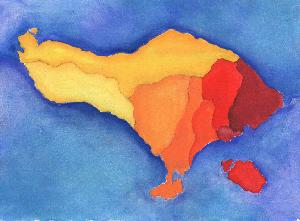General Information about Bali

Geography
One of the approximately 14,000 islands that comprise the Indonesian archipelago, Bali anchors east of Java, separated by the small Strait of Bali, and surrounded by the Java Sea on the north, the Indian Ocean on the south, and the Strait of Lombok on the east. A string of volcanic mountains crown the northern part of Bali, with Gunung Agung (Mount Divine, literally) as the tallest at 3,142 meters. This volcano, as well as Mount Batukaru, Mount Batur, and Mount Merebuk is still active.
Extremely important to the agricultural life of Bali, especially for rice crop, the rivers of Ayung, Unda, Sungsang, Balian, Yeh Sumi, Petanu, and Saban carry the water from the highland to the seas. There are four major lakes: Lake Batur at the crater of Mount Batur, Lake Buyan, Lake Bratan, and Lake Temblingan.
Climate
Bali enjoys tropical weather, being only a few degrees south of the equator. It means that the sun rises at 6 AM in the morning and sets at 6 PM in the afternoon, everyday of the year. It means that temperature variation is very small, averaging around 26-30 Celcius, and it does not have four seasons (except the hotel, of course). It only has a wet season, typically from September to February, and a dry season for the other half of the year. But the difference is marginal; at the peak of the wet season you will see about a half-hour to an hour serious downpour in the afternoon, about perfect for a siesta. The rest of the time: nice, warm temperature, especially with a twist of sea breeze in the beaches of Kuta or Nusa Dua.
This climate endows Bali with a number of unique vegetation, including waringin trees (banyan), salak Bali, and a multitude of flowers from a very fragrant cempaka (Michelia champaca) to literally thousand kinds of orchids. Its fauna is equally rich. Bali is the native land to the Bali Tiger, which is almost extinct; Bali cattle, graceful animals not like other cows; bats that haunt caves like the Bat Cave near Kusamba; sea turtles of Nusa Dua; Jalak Bali or Bali Sterling (Leucopsar rothschildi) that has inspired countless number of painters and artists.
Economy
In 1990, the population of Bali is 2,778,000, 93.18% are Hindus, with a density of 500 persons per sq km, and an average growth of 1.18%. Bali's economy is one of the most vivacious in Indonesia, fueled by constant flow of tourism dollars and supported by agricultural production and trade revenues. Balinese people are gifted artists, producing garment, and arts & crafts that are exported. In addition to gorgeous nature and enchanting people and culture, Bali is also endowed with fertile land. Its economy is growing at close to 9% per year, with export values close to $150 millions.
The primary export products are garments, handicrafts, and agricultural products such as fish, coffee, tuna, seaweed, and vanilla. The arable land of South Bali and a sophisticated irrigation mechanism arranged through the Water Temple system ( which has been shown by a couple of University of Southern California scientists to be optimal), give Bali and its people two full crops of rice year after year. Corn and other horticulture are also planted.
The land is also an excellent grazing pasture for Balinese cattles, water buffalloes, goats, sheeps, and horses. Pigs are also raised and consumed a lot in Bali, and chickens and ducks are raised by the farmers in their land. The rain forests in Bali produce cayuput oil, rattan, and incense, which is used ubiquitously in Balinese ceremony. There is about 8,535.05 ha of productive forest area. The Balinese are not too eager to explore the sea, because they believe that it is the place of evil spirits. However, tuna, baramundi, seaweed, and shrimp are quite abundant in the seas surrounding Bali. Balinese have about 841.37 ha of water fishery area.
Epilogue
source : www.indo.com


0 Comments:
Post a Comment
Subscribe to Post Comments [Atom]
<< Home